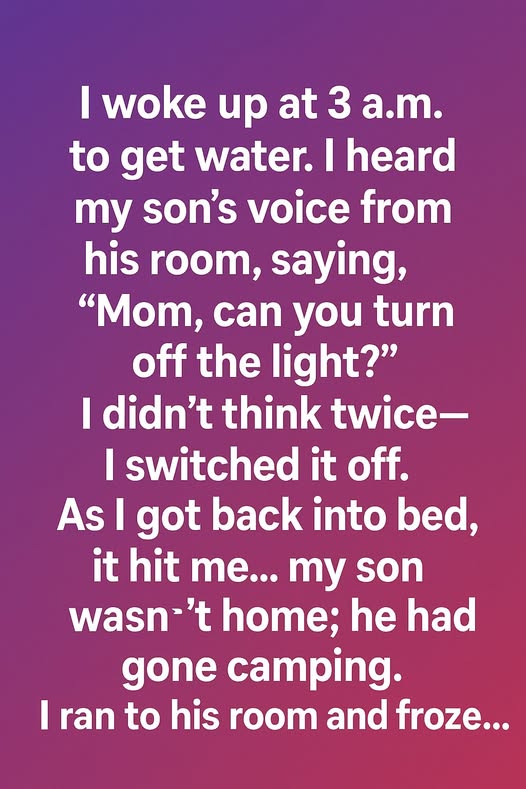
I woke at 3 a.m., thirsty and groggy, pulled out of sleep by the dry scrape of my throat. The house lay wrapped in that particular, fragile quiet that only the early hours can hold: the refrigerator’s low hum, the muffled thump of the furnace, the distant sound of an alarm clock somewhere down the street. I padded barefoot across the cold floor to the kitchen, poured a tall glass of water, and was just about to take a long, grateful sip when a small voice called from down the hall.
“Mom, can you turn off the light?”
I slid back into bed, blankets pulled up to my chin, and let the silence fold over me again. For a few slow breaths everything felt right: the soft weight of the duvet, the steady beat of my heart. Then an unsettling realization threaded its way through my drowsiness and tightened my chest. My son wasn’t home. He had left earlier that afternoon for a camping trip with friends — his backpack still in the garage, his sleeping bag rolled tight, his toothbrush sitting in the bathroom cup like it had been abandoned mid-routine.
Fear and confusion churned like a storm. The house seemed suddenly unfamiliar — rooms rearranged by shadows, every creak suddenly suspicious. I stood and walked back down the hall. The door to his room was slightly ajar, as I had left it when we said goodbye that morning, and when I pushed it open the room was exactly what it should be: empty, neat, ordinary. His bed was made, clothing folded where it belonged, posters on the wall unchanged. There was no sign that anyone had been there, and yet the voice in my memory was so clear I could have sworn I’d heard him call.
I lingered in the doorway, looking at the small things that anchored him to this room: the stack of dog-eared comic books on the shelf, the dented metal water bottle, the tiny scuff on the desk where he had once leaned his elbow. The silence felt too absolute, the kind of silence that presses against your ears and fills your thoughts.
Then I noticed the framed photograph on his nightstand — one of those snapshots that catches you off guard with how quickly time moves. It showed him at maybe five or six, grinning with gap-toothed abandon, my arms wrapped around him as if I were trying to hold on to that very moment. The hallway light hit the glass just so, and for a breath the image seemed to stir. Maybe, I thought — maybe it wasn’t a voice at all but a memory, a sound tugged loose from the weave of years.
I sat on the edge of the bed and picked up the frame. The picture was warm in my hands, the paper smell of stale ink and sun-faded edges carrying with it the residue of afternoons and birthday cakes, scraped knees and whispered secrets. I pressed my forehead to the glass and felt, for a moment, both the sting of loss and the comfort of continuity.
“I love you,” I whispered into the quiet room, a sentence too small for the breadth of what I felt. “I’ll always be here.”
That night I didn’t tell him about the voice when he came home sun-smudged and tired the next afternoon. I hugged him longer than usual, breathing in the camping smell of pine and sweat and sunscreen, feeling the solid reality of him in my arms. I watched the way he unpacked his bag, the way he absentmindedly tossed a sock under the bed, the way his laughter filled the kitchen over something small and ridiculous his friends had done.
Maybe the voice had been nothing more than sleep-sound tricking my mind, or the echoes of a thousand small conversations lodged behind my ribs. Or maybe — if you believe in a little quiet magic — it was memory and love made audible for a second, a reminder to pay attention.
Whatever it was, it changed me. I found myself slowing down in the days that followed: lingering at the breakfast table while he ate, asking more about his plans, listening harder when he spoke. I began to notice the little ordinary things — the imperfect way he folded his shirts, the exact pitch of his laugh — and felt them settle into me like treasure.
In time, the late-night calling cleared into a simple lesson: life’s ordinary moments are fragile and luminous. That soft voice in the dark — whether from memory, from a sleeping brain, or from somewhere kinder — had done what no alarm could: it had woken me to the present. And in the quiet that followed, I learned to cherish the noisy, imperfect, ordinary now.